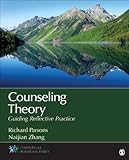Counseling theory : guiding reflective practice / [edited by] Richard D. Parsons and Naijian Zhang.
Material type: TextSeries: Counseling and professional identityPublication details: Los Angeles : SAGE, c2014.Description: xxx, 486 p. ; 24 cmISBN:
TextSeries: Counseling and professional identityPublication details: Los Angeles : SAGE, c2014.Description: xxx, 486 p. ; 24 cmISBN: - 9781452244655 (pbk.)
- 158.301 23 P269
| Item type | Current library | Call number | Status | Date due | Barcode | Item holds | |
|---|---|---|---|---|---|---|---|
| Books | ISI Library, Kolkata | 158.301 P269 (Browse shelf(Opens below)) | Available | 136588 |
Includes bibliographical references and index.
Editors' preface --
Acknowledgments --
About the contributors --
The value of theory to reflective practice --
Theory and the reflective practitioner / Richard D. Parsons --
Multicultural considerations: within and beyond traditional counseling theories / Dong Xie --
Case conceptualization: the case of Y-Chun / Naijian Zhang and Richard D. Parsons --
Theories and their applications --
Freud and psychoanalytic theory / Faith Deveaux --
Individual psychology: Alfred Adler / Robyn L. Trippany-Simmons, Matthew R. Buckley, Kristin Meany-Walen, and Tiffany Rush-Wilson --
Existential counseling and psychotherapy / Mark B. Scholl, Michael Walsh, and Michelle Perepiczka --
Carl Rogers and client-centered counseling / Marjorie C. Witty and Ray Adomaitis --
Gestalt therapy / Joseph Spillman and Christina M. Rosen --
Cognitive-behavior theories / Julia Y. Porter --
Behavior theory / Barbara Trolley and Christopher Siuta --
Reality therapy / David A. Scott and Hannah G. Barfield --
Solution-focused therapy / Brandé Flamez and Joshua C. Watson --
Relational-cultural theory in the context of feminism / Kristi B. Cannon, Jason Patton, and Stacee L. Reicherzer --
Family and couples therapy / Rebecca M. Goldberg --
Looking to the future --
Seeking integration / Adam Zagelbaum, Maureen Buckley, Shana Friedman, and Kalia Gurnee --
East meets west: integration and complementation / Michael G. Laurent and Shengli Dong --
Index.
This book presents theory as an essential component to both counselor identity formation and professional practice. Drawing on the contributions of current practitioners, the text uses both classical and cutting-edge theoretical models of change as lenses for processing client information and developing case conceptualizations and intervention plans. Each chapter provides a snapshot of a particular theory/approach and the major thinkers associated with each theory as well as case illustrations and guided practice exercises to help readers internalize the content presented and apply it to their own development as counselors.
There are no comments on this title.



























